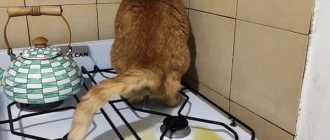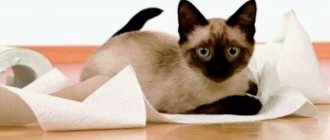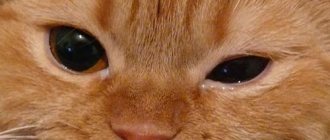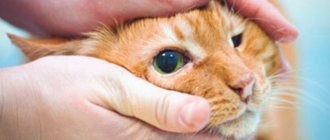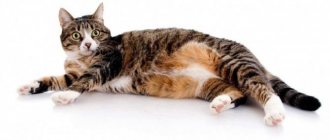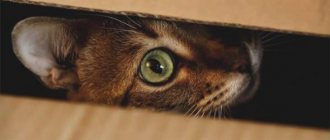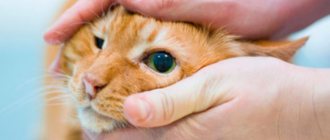What to do if a kitten's whiskers break?
A pet's illness is always scary, and it is not known who is more worried - the animal itself or its owner. But not all cat owners notice such a small, at first glance, problem as whisker breakage. Sometimes this is not just a physiological feature, but a signal of internal disorders. It is especially important to establish the reason why a kitten’s whiskers are breaking - the baby has just come into this world, but, quite possibly, something is already wrong with him. However, precaution is also important here - in some cases the whiskers break on their own, and there is no need to take the cat to the veterinarian. The question arises - how to determine when to worry?
When is mustache breakage natural?
First of all, overly worried owners should understand that whiskers - or whiskers, as they are scientifically called - can fall out naturally. This process is as natural as cat or dog shedding, and there is nothing to be afraid of. Vibrissae are coarse hairs that also need to be renewed every few months. After some time, a new one will grow in place of the fallen hair. However, if a cat's whiskers break off, then this should already be a cause for concern, and it is better for the owner to eliminate the cause.
Sometimes a cat has no whiskers. There are several reasons here :
- If the cat is a Sphynx breed, then the absence of whiskers is normal. Also, some other breeds hybrid with the Sphynx may also lack mustaches. At the same time, some individuals may have mustaches, and in this case, cutting them off is strictly prohibited;
- Due to curiosity, the kitten's whiskers break very often. Sometimes they get a little shorter because the desire to explore all the places doesn't always end well. Sometimes the whiskers break at the root - the cat, wanting to calm her baby, bites the whiskers;
- breaking of whiskers can occur as a result of dominance of another cat in a peculiar tribe.
All these cases are natural and there is no need to worry. After some time, the broken mustache will grow back.
Some causes of mustache breakage
The reasons can be very diverse. Here are some of them .
Dry air in the apartment. When the air in the house is too dry, especially in the winter season when there are a lot of heating devices, this can cause the cat's whiskers to break. Unfortunately, not a single cat is immune from this; you just need to try to help it.
Frequent bathing and poor-quality shampoos. Excessive water procedures, especially with poor quality cosmetics, leads to seborrhea, a painful skin condition. This can also cause the mustache to break off and even fall out.
Adolescence in a cat provokes a temporary metabolic disorder, as a result of which the whiskers can also break.
Diseases that can cause mustache breakage
Another reason why a cat may lose its whiskers is improper nutrition and drinking. If your pet doesn’t want to drink or, on the contrary, starts going to its water bowl too often, then this is a reason to be wary and consult a doctor. A broken mustache in this case will not be a cause, but rather a symptom of some disease. It's the same with nutrition. With an unbalanced diet, the mustache loses its elasticity and can break at the first unsuccessful fall or jump. Moreover, nutritional imbalance can be revealed in different cases :
- Industrial products . Foods, although labeled as “vitamins and minerals,” may often be made from products that are not beneficial for cats. This is especially true for economy class products. There may also be intolerance to any component. But industrial feed poses the greatest danger due to the abundance of chemical additives, dyes and salts. All this can cause enormous harm to a cat’s body.
- Natural products . Here, the reasons for the most part may be hidden in surrogate products - it is not always known what the meat or skin of the poultry was processed with, what the cottage cheese was made from, or what chemicals were mixed into the milk. The cat's body is very sensitive to such components, so it is quite possible that this is the reason why the kitten has brittle whiskers.
Food allergy . It is likely that an allergic reaction in a cat is accompanied by loss of all hair, not just whiskers, as well as lacrimation and itching or dermatitis.
Following allergies and unbalanced nutrition comes a cause such as vitamin deficiency. The animal may lack vitamins, which is why the cat's whiskers break. You can overcome this problem by contacting your veterinarian for special medications that include a complex of all necessary additives. It is important not to make a mistake with the dosage - an excess of vitamins in the cat’s body is not a favorable phenomenon and can also cause whisker breakage.
Hormonal disorders. Hypothyroidism and hyperthyroidism—an underactive and overactive thyroid gland—are also common in cats. Excess or lack of weight, as well as thinning and loss of hair (including whiskers) are clear signals that there are some problems.
Parasites and fungus . The problem of infection with parasites and infectious diseases is very scary for cats, and the main signals to action for the owner are hair loss and whiskers. The parasites simply gnaw the hairs, remaining to live in the follicles, and the fungus damages all layers of the skin, as a result of which the whiskers simply do not grow - on the contrary, they curl up, begin to grow in and form purulent follicles, which are very painful for animals.
Brittle whiskers in a pet
Cats' whiskers are also called "vibrissae"
For any cat, even an apartment cat, having healthy and strong whiskers is very important. However, modern pets often suffer from problems such as whiskers falling out and breaking off.
What to do about it?
How to help a cat?
One of the main reasons why a cat's whiskers break is related to its diet. The pet must consume a certain amount of proper and balanced food containing vitamins and microelements.
A lack of minerals and vitamins can cause your kitten's whiskers to be short, broken, or missing altogether. Tiny kittens should be fed using natural food.
And in general, the issue of choosing food for a pet needs to be approached seriously and responsibly.
If the problem is in the physiological characteristics of your pet’s maturation, you can help his body get stronger quickly with the help of calcium, omega-3 fatty acids and vitamins. However, you should not choose the drugs and dosage yourself, otherwise you can harm the cat even more.
Only a veterinarian can give qualified advice on this issue.
Sometimes the vibrissae break off due to some kind of fungal infection, in which case you should definitely consult a doctor.
It happens that the whiskers become damaged while playing with other pets or children. It is necessary to monitor the child’s behavior and not allow him to abuse the animal.
With the help of whiskers, cats better navigate in space and move in the dark. Therefore, you need to do everything to ensure that the kitten recovers.
Having noticed a similar problem, every inexperienced owner wonders why the cat’s whiskers are falling out, what to do and how to help her. When hair loss is rare and temporary, there is nothing to worry about. Frequent and abundant loss and fragility of the whiskers is a reason for an early visit to the veterinarian.
If during the examination and conversation it is revealed that the cause of the loss of whiskers was an incorrect feeding system, a veterinarian will help you adjust a new balanced diet.
https://www.youtube.com/watch?v=LKpZXFNCXkQ
The whiskers returning to their previous shape will be living evidence that restorative changes are taking place in the cat’s body.
What can be done about this problem?
What should you do if your cat’s whiskers begin to fall out and break? The universal answer is this: the first and most important thing an owner can do for their pet is to calm down, pick up the animal and take it to the veterinarian. Under no circumstances should you try to cure this problem yourself, because most often mustache loss is a symptom, not a disease . In general, no special actions can be taken in this case - you should not comb your mustache or lubricate it with any oil, you just need to find the cause of this problem and eliminate it.
Source
What are vibrissae?
To understand how important whiskers are for a kitten, let's try to figure out why he needs them. Literally, vibrissae means “to vibrate.” If you take a closer look at the cat, you will notice that they vibrate from the objects that it touches.
Each antennae is an independent organ of touch that is connected to the brain. Vibrissae are located in the skin three times deeper than the bristles and are surrounded on all sides by nerves through which information is transmitted to the pet’s brain.
Each antenna transmits information to its corresponding area of the cerebral cortex. That is why, it is necessary to pay special attention to the factor of loss of whiskers by the cat, since he is temporarily unprotected from the outside world.
Existing types of illness
- Physiological alopecia. Localized on the temples, back of the head. It is observed in infants in the first months of life due to constant friction against the pillow. Treatment is not required because the disease will go away when the child stops lying down all the time.
- Anagen. Associated with drugs used to treat cancer.
- Hereditary. Appears in a child if his parents also had this pathology.
- Congenital. It is one of the symptoms of a congenital pathology or defect. Quite rare. Occurs against the background of endocrine, skin diseases, etc.
- Telogen. Develops due to sudden weight loss, surgical interventions, past illnesses against the background of elevated body temperature.
- Focal or nested (baldness). Serves as a symptom of disorders in the functioning of the immune system. The lesion is local, that is, separate areas of baldness form on the head. This form of alopecia affects one child in a thousand. Source: N. Bekbauova, R. Aliyeva, Zh. Zharasova, O. Stepanova Etiology of alopecia areata in children // Medical Journal of Western Kazakhstan, 2012, No. 3(35), p.90
- Diffuse. The most common type. Represents a uniform loss of hair from 150 per day.
- Seborrheic. Develops due to seborrhea.
- Universal. Loss of hair all over the body.
- Broca's pseudopelade, or atrophying alopecia. Hair loss occurs in the forehead and crown areas. This is a rare pathology among children, usually affecting women over 35 years of age.
Why does a cat need a mustache?
A cat's whiskers perform three important functions:
- Hunting. Of course, not all domestic cats hunt mice, but it is with the help of their whiskers that they determine how safe their meal is. They sense with their whiskers whether food is hot or cold. When a cat loses its whiskers, it is sometimes forced to touch food with its paw.
- Orientation. With the help of whiskers, the cat navigates in space; they help the pet move in complete darkness and silence. He touches objects with his mustache, thereby determining what is in front of him.
- Communication. An experienced owner, by the location of the whiskers, will understand whether the pet is in the mood for communication, this is especially true during the mating period. If the antennae are forward, then the cat is not averse to communicating; when they puff up, then he is clearly not in the mood for close communication. When a cat's whiskers are pressed to its face, it is clearly frightened or the company is unpleasant to him. With its whiskers down, the cat is ready to play.
Prevention
What to do if an unpleasant situation occurs? It is impossible to help a pet at home. Veterinarian consultation required. The doctor will examine the animal, take tests and, based on the results, prescribe a course of treatment.
In most cases, mustache loss is a sign of other serious diseases . Let us note the main methods of treatment for different diagnoses:
- Parasites - anthelmintics (tablets for worms) and other antiparasitic drugs are prescribed.
- Allergies – antihistamines.
- Infections - antibiotics.
- Avitaminosis - a course of essential minerals and substances (fatty acids, biotin, taurine, etc.). The main thing when taking it is to strictly follow the dosages prescribed by the veterinarian. Otherwise, the situation will worsen.
At home, as mentioned above, it is better to adhere to a balanced diet, avoid low humidity, and carry out a preventive course of treatment for worms and parasites. A prerequisite is the presence of a sufficient amount of water, especially when feeding dry food. Preferably starting from the middle price range.
Ultimately, a cat's whiskers are not just for beauty. They perform an important tactile function, helping to navigate a new environment or find a common language with representatives of the opposite sex.
IMPORTANT! Based on the specifics of the breed, it is not recommended to delay it in a situation where hair loss or breakage is detected. This, in most cases, is an external manifestation of problems with the immune system.
Why do mustaches break?
There are not many reasons to help you understand why your pet’s whiskers break:
- The main reason is the kitten's unbalanced diet. The animal must receive all the substances necessary for full functioning.
- Physiology can help answer the question of why kittens' whiskers break off. All kittens that have reached the so-called “transitional” age, at a certain period, their antennae break and fall out. At this time, consultation with a veterinarian is important, as you need to help your pet cope with the load.
- Another answer to the question of why a cat’s whiskers are damaged is the presence of a fungal infection.
- The presence of helminths also leads to a similar problem.
- Sometimes such questions arise when the animal does not fully absorb the minerals and vitamins in the feed. This is due to a violation of the mineral balance in the kittens’ body.
Psychological problem
If there are several animals in the house, and the kitten that is losing its whiskers is apparently healthy and receives high-quality food, then most likely the answer to the question of why the pet’s antennae break off lies in the relationship between the individuals:
- By breaking each other's whiskers, they thereby demonstrate their superiority. This kind of struggle for leadership needs to stop. The owner must show the pets his disagreement with this situation.
- If the cat and kitten are not separated in a timely manner, then she, breaking off his whiskers, shows who is boss in the house.
- Often a kitten's antennae are damaged while playing with children, in which case it is necessary to talk to the kids about the importance of this organ.
- Sometimes owners trim their pet's whiskers for beauty. This should never be done, even if the cat never goes outside. The poor thing is under a lot of stress at this time.
How to prevent your mustache from falling out
For a thick mustache, follow these recommendations:
- You can't trust cheap food . An unclear composition, at best, will simply not bring any benefit, and at worst, it will cause food intolerance and destroy the immune system.
- Stick to your parasite treatment schedule . Remember to use anthelmintic drugs.
- Process raw meat and fish before serving . Heat treatment will destroy worm eggs.
- Avoid competition for leadership . Protect the kitten from aggression from older family members.
- Be sure to include vitamins in your diet when feeding naturally.
- Strictly monitor the amount of water consumed when dry feeding. Lack of fluid can lead to the development of urolithiasis.
- Visit your veterinarian for preventative purposes at least once a year.
Never trim your cat's whiskers. Any length that seems excessive is suitable for this member of the family.
In conclusion, I note that the mustache is an important organ, the condition of which must be carefully monitored. Follow these tips and try to avoid causes that can harm your cat's whiskers.
What to do if your cat's whiskers break off
In order for a cat to walk around with a rich mustache, you need to follow some simple rules:
- The food should be rich in vitamins and minerals. The lack of any element leads to the loss of vibrissae, that is, they can either be broken off or shortened.
- It is better to feed kittens natural food, because it better meets the needs of his body. You can add eggs and vegetable oil to his diet.
- The body of a teenage kitten needs additional calcium, phosphorus, and vitamins. In order to help your pet, you need to consult a veterinarian; you should not select the drug and dosage for the animal yourself, because this can harm it. As a rule, during this period the veterinarian prescribes Omega-3, vitamins A and D, and calcium.
- If the pet receives ready-made high-quality food, then it does not need additional intake of vitamins and microelements.
- To solve the problem associated with the loss of whiskers, you need to be tested by a veterinarian for the presence of a fungal infection. If it is confirmed, then after being treated with the prescribed medications, you can forget about such a nuisance.
- It is also necessary to take tests for the presence of helminths; if they are confirmed, the veterinarian will prescribe the necessary medications.
- If a cat has problems with mineral imbalance, the veterinarian can prescribe the drug Gamavit, which can be given by injection or given to the animal.
If the owner takes care of the kitten in a timely manner, selects a balanced food for it, checks for the presence of a fungal infection and excludes psychological problems, then over time the broken whiskers will grow back and the pet will be able to calmly navigate in space.
Source
Diagnosis of the disease
If adult family members or your pediatrician notice signs of alopecia, you need to understand why your hair is thinning. For this purpose, extensive diagnostics are carried out. To treat alopecia, a child should first visit the following pediatric specialists:
- dermatologist;
- trichologist;
- endocrinologist;
- gastroenterologist;
- neurologist.
These doctors will prescribe a series of examinations to determine the cause of the pathology:
- Gastrointestinal examination. It may include tests for Helicobacter pylori (a stomach bacterium that causes gastritis) using PCR and ELISA methods, stool analysis for dysbacteriosis, ultrasound of the abdominal organs, as well as fibrogastroduodenoscopy (FGDS).
- An endocrinologist may prescribe a blood test for the level of thyroid hormones (AT, TSH, etc.), cortisol, the level of ionized calcium, and ultrasound of the thyroid gland.
- To determine the microelement status of a child, a spectral study of hair and blood is performed to determine the content of microelements.
- ELISA diagnostics allows you to detect antibodies to herpes, hemolytic streptococcus, helminths, Giardia, and fungi.
- The trichologist prescribes a trichogram, computer diagnostics of the scalp, and phototrichogram.
- In clinically unclear cases, a scalp biopsy is performed followed by histology. This is necessary to exclude cicatricial alopecia, which is a symptom of lichen planus and systemic lupus erythematosus.
- If there is doubt about the diagnosis, the child may be referred for consultation to a mycologist.
- Rheoencephalography is indicated for common forms of baldness; it allows one to exclude disturbances in blood flow in the cerebral veins.
Main reasons
Each of the mustaches is an independent organ of touch, transmitting information to the cerebral cortex. In the process of their vibration, as well as from contact with objects, the animal receives information about their location, ambient temperature, and also about its position. Therefore, if a kitten’s whiskers break off, it becomes defenseless in front of the outside world.
Why did the cat's whiskers break off?
Adult animals are characterized by partial replacement of whiskers, when old ones fall out and new ones grow in their place. If the cat notices active loss of whiskers or they visually become smaller, the owner should pay attention and find a possible cause. Such a symptom can either have a trivial cause or indicate serious health problems.
External factors for mustache loss include:
- Low air humidity. This problem occurs during the heating period.
- Frequent bathing of the animal, as well as the use of poor quality shampoos.
- Hormonal imbalances in adolescence.
- Lack of water. Refusal to drink or excessive absorption of liquid is a reason to consult a veterinarian. Loss of antennae in this case is a harmless symptom of dangerous diseases.
Internal factors include the following:
- Poor nutrition. At the same time, whiskers can fall off both with natural nutrition and with feeding with industrial compounds. In the first case, the cause is surrogate products, as well as meat undergoing chemical processing. In the second case, cheap food, consisting of large amounts of beans, dyes, chemical salts and other dangerous substances, is most often to blame.
- Allergy. If you have an individual intolerance to certain components, the coat may deteriorate, the claws may peel off, and the mustache may fall out and break off. Redness of the eyes and development of dermatitis are also possible.
- Lack of vitamins. The development of vitamin deficiency is reflected in the quality of coat, eyebrows and mustache. If an animal does not receive the required amount of microelements and vitamins from food, it is necessary to additionally introduce vitamin supplements into the diet.
- Lack of microelements. Often the mustache can break due to a lack of potassium, magnesium, phosphorus and calcium. All these elements are useful in combination, otherwise mustache loss is a possible minimum. The main reason may be the development of urolithiasis and hypocalcemia.
- Hormonal disorders. Too much or too little hormones can lead to a variety of problems. But first of all, the fur and whiskers suffer. Overweight is common.
- Presence of parasites. Fleas and ticks can lead to allergic reactions, as well as a decrease in the cat's immunity, which negatively affects the condition of the coat and whiskers. Whip eaters are able to gnaw the vibrissae at their base.
- Fungal diseases. Under the influence of the fungus, the hair follicles become clogged, crusts and growths form on the skin. Vibrissae may grow into the skin or not grow at all.
What should the owner do?
In order not to wonder why a kitten’s whiskers break, it is enough to follow a few rules:
- Buy high-quality food, balanced with essential vitamins and minerals. Since a deficiency can lead to loss of vibrissae or disruption of their integrity.
- For a kitten’s diet, it is better to choose natural food consisting of meat, offal and vegetables. Vegetable oil and eggs can be used as additives.
- During adolescence, microelements are especially important: calcium, magnesium, potassium and others. On the recommendation of a doctor, you should choose a complex that has the optimal ratio of these elements.
- If mineral imbalances are detected, Gamavit is a good choice. Your veterinarian will tell you how to take it and why.
When fed with high-quality industrial feed, the animal does not require additional vitamin complexes.
Is mustache loss dangerous?
Since whiskers for a cat are not just decoration, but the main organ of touch, their loss will cause certain problems. Without them, the animal becomes defenseless at night for at least a month and will not be able to foresee the likely danger and determine the size of surrounding objects.
The loss of whiskers is not only unpleasant for the animal, but in some cases may indicate diseases: hormonal imbalances, exhaustion or obesity, urolithiasis or kidney failure.
Mustache care
The kitten's eyes do not open: the main reasons and what can be done
There are no special mustache care procedures. The place where they fall out or break does not need to be processed, as well as any other procedures. However, there are a number of manipulations that definitely should not be done.
Do not pull out, break or trim your mustache. Even if there is a suspicion that they are too long or the cat is uncomfortable walking with them, removing the whiskers and violating their integrity is prohibited. In addition, the rule that if you trim the whiskers, they will grow longer in the future - this is fundamentally wrong.
The loss of 1-2 antennae is not dangerous for a kitten and is natural. In other cases, you should take a careful look at the animal and try to find the reason for the massive loss of its senses of touch. If there are accompanying symptoms, as well as suspicions of the presence of disease or parasites, you should consult a veterinarian. An examination and tests will help identify the cause of the loss or deterioration of the kitten’s whiskers.

